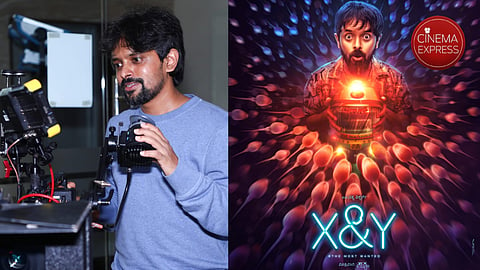

D Satya Prakash, best known for his award-winning films Rama Rama Re and Ondalla Eradalla, is back with his most daring and philosophical film yet—X & Y. The film, based on chromosomes, soul matchmaking, and pre-birth thought, blurs the line between realism and fantasy while staying deeply rooted in society.
When asked if being a "National Award-winning filmmaker" still holds weight, Satya Prakash doesn’t hesitate. “When I make a film, the audience comes to see the story, not my awards. Awards are recognitions, yes, but they hang on walls. What stays alive is the connection with the audience—that is the real reward.”
Known for exploring weighty themes like death (Rama Rama Re) and childhood (Ondalla Eradalla), X & Y turns the lens inward—toward life before birth. Is the film about gender, identity, or destiny?
“I’m talking about society. When we invite a guest, we clean the house, cook well, and make them comfortable. Shouldn’t the same mindset apply when bringing a child into the world? What kind of thoughts are we passing down to the next generation?”
While X & Y, which releases on June 26 deals with soul matchmaking, Satya himself is not interested in marriage. So, how did the story come to him? “Marriage aside, I was once a child, watching the world. I had questions about caste, labels, and divisions. For years, I didn’t even understand what caste meant. Once I did, I saw how society builds walls. This film comes from that place of questioning, of wanting to unlearn what we’re taught.”
Satya Prakash not only directed and wrote the film, but he also plays the lead. “The decision was out of necessity,” he says. “I approached many actors, but they didn’t have the time. I didn’t want to wait. I explained the story to several people, but they all wanted to play the child, Atharva Prakash’s role, not the one I had in mind for them. So I stepped in, and I have Brinda Acharya and Aanya among others as part of the cast.”
As a director-actor-producer, how did he manage the chaos on set?
“A co-actor in this film even asked why I was acting. But after they watched the film, one of them gave me a thumbs-up and said, ‘You proved it.’ I don’t think it’s about controlling the set. It’s about loving the story enough to live it from all angles.”
Despite its abstract theme, X & Y connects emotionally, he insists. “We screened the film for auto drivers—because I play one in the film. During the climax, they were sobbing. There's a belief that such audiences only enjoy mass films. But they too feel deeply.”
Combining comedy with philosophy wasn’t a gimmick—it was intentional. “Serious issues can be told in lighthearted ways. That’s how people listen.”
But is he worried the film might be too niche or abstract? “Every story feels risky until it reaches someone. X & Y is not a larger-than-life film; it’s intimate, immediate. I’m not sure if an audience for it exists yet, but maybe we’re creating it. Once they come in, they will connect.”
And through the eyes of an unborn soul, does he believe humanity deserves a second chance? “Only if we’re ready to clean the house, not just for ourselves, but for those yet to come,” he concludes.